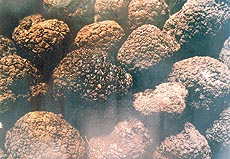Ultimate
French delicacy
French
black truffles are getting scarcer all the time. By one
estimate, the crop has declined from about 1,000 tonnes
per year at the beginning of the 20th century to about 20
tonnes in the last decade of the same, opines Shirish Joshi
THE truffle is a mushroom from
France. Called the "Black Diamond of
Gastronomy," this truffle of southern France has
been valued for centuries as the ultimate French
delicacy. It is not a mere fungus or common mushroom. The
French black truffle is rare and literally worth its
weight in gold. The prices are more than £ 300 a kg in
England. In the USA the price is $ 1,500 a kg. Truffles
are harvested in early November.
 Because it is pungent and
aromatic, it is used in small amounts only. It is most
often sprinkled as black specks in some French delicacies
and omeletts. The black truffles grow unpredictably and
can not be cultivated or even seeded in specially planted
oak groves. Because it is pungent and
aromatic, it is used in small amounts only. It is most
often sprinkled as black specks in some French delicacies
and omeletts. The black truffles grow unpredictably and
can not be cultivated or even seeded in specially planted
oak groves.
French black truffles
are getting scarcer all the time. By one estimate, the
crop has declined from about 1,000 tonnes per year at the
beginning of the 20th century to about 20 tonnes in the
last decade of the same. The explanation is that wars,
fire and housing colonies have destroyed the oak tree
forests that the truffles require. Even air pollution due
to automobile exhaust and other industrial gases have
affected the output of the truffles.
However, it has recently
been found possible to promote artificial production of
truffles by planting truffle-oaks which carry with them
the spores of truffles, amid oak or hazelnut plantations,
a mycelium obtained from a mash of truffles in water
which has been spread upon the green leaves of these
trees.
There are about 30
different varieties of truffles in the whole world.
Italian truffles are white English ones are black or
brown. The best truffles in France grow in the forests
around Perigord, in France. The truffles from Perigord
are black with white veins. They are intensely flavoured.
Italian truffles are
white. The best Italian truffles grow in Italy’s
Abruzzo region. They are sold for $ 4,000 a kg in the
USA. Italians call it ‘Back Gold’. A dinner
consisting of delicacies flavoured with white truffles
costs around $ 80 per head.
The truffle is a tuber
like mushroom that grows completely 7 to 30 cm
underground. It receives nourishment from the roots of
trees, primarily the oak trees which are common in
Europe. But wherever the truffles grow, everything above
dies.
Truffles are called
Guchchhi in India. They grow in Kashmir, Himachal
Pradesh, Tehri Garhwal, Kumaon, Sikkim, Darjeeling and
Arunachal Pradesh, mainly as a forest product. Farmers in
India, who harvest this wild produce, have individual
methods to locate a truffle. Indian truffles are sold for
Rs 300 per kg.
The harvesting of
truffles is a tricky business. An unusual phenomenon was
observed by ancient people from Babylon for the first
time that wild pigs were digging for this fungi that
grows underground in early winter months. Even today the
fungi is harvested by using dogs or pigs which are
especially trained to sniff out the distinctive aroma.
In the Perigord region
farmers use female pigs as searchers for truffles. It is
a pig’s job to sniff out this buried treasure. Pigs
can detect a truffle 25 cm deep from a distance of about
6 metres. While pigs have a keener sense of smell, they
eat the truffles. Their mouths are covered with nets, so
that they do not eat them.
Dogs’ sense of
smell is not so keen but they do not gobble them up. Dogs
are easier to carry in the back seat of a car than pigs.
Mushroom collectors then dig out the truffles. Such
truffle-hunting dogs have to be guarded carefully as
other truffle hunters are likely to steal them. But the
method has its own problems, like the short attention
time of animals and erratic search pattern. This results
in the loss of about 20 per cent of the crop.
Earlier it was believed
that truffles had some powers to encourage love making. A
chemical analysis has shown that truffles contain some
steroids which are similar to hormones produced by human
beings through the organs of their reproductive system.
Scientists working at
the University of Manchesters Institute of Science and
Technology in collaboration with French scientists have
developed an electronic nose to detect truffles. The
gadget relies on the distinct odour of truffles. The
device has two dozen sensors containing semi-conducting
polymers.
The electrical
resistance of these polymers changes when they come into
contact with air-borne chemicals that constitute the
odour of truffles. Signals from the sensors are processed
by a computer, programmed to recognise the unique odour
of truffles.
|

